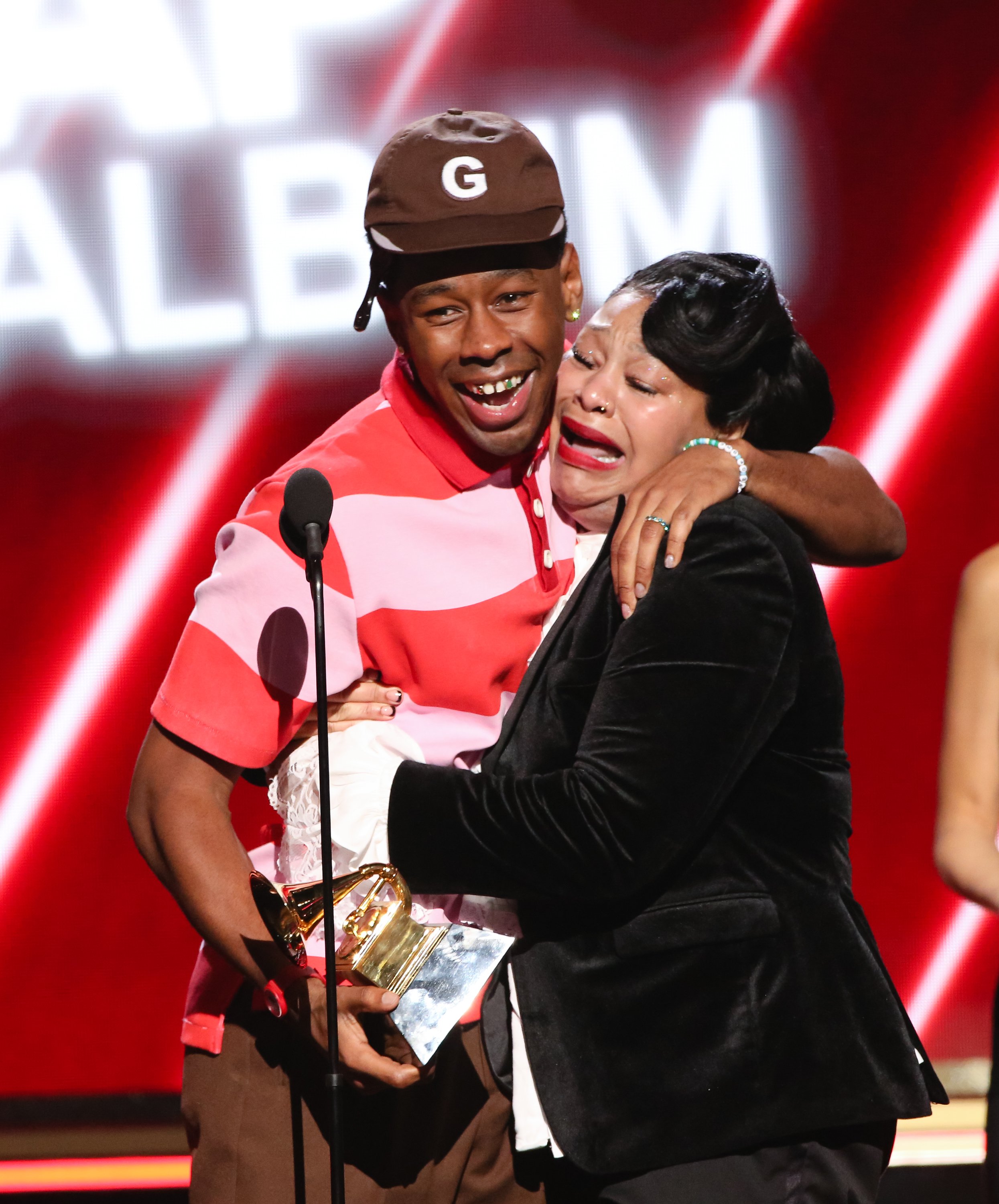Has the absence of a father truly shaped the artistic genius of Tyler, the Creator? The echoes of this absent figure resonate throughout the rapper, singer, songwriter, and record producer's work, transforming personal pain into a unique creative identity that has captivated millions.
Tyler, the Creator, born Tyler Gregory Okonma on March 6, 1991, in Ladera Heights, California, has rarely spoken publicly about his father. This absence, a significant detail in his life, has become a recurring theme woven into the fabric of his music. His mother, Bonita Smith, has consistently been a central figure, providing unwavering support for his musical endeavors and even making appearances on his albums. Moments in Tyler's work hint at a more complex story, such as the revelation in "Chromakopia" where Bonita Smith suggests that his father may have desired a presence in his life. However, the void left by his fathers absence has undoubtedly influenced Tyler's music, sparking his emotions into fuel for his art.
| Category | Details |
|---|---|
| Full Name | Tyler Gregory Okonma |
| Birth Date | March 6, 1991 |
| Birth Place | Ladera Heights, California, USA |
| Known As | Tyler, the Creator |
| Occupations | Rapper, Singer, Songwriter, Record Producer, Fashion Designer |
| Notable Albums | Goblin (2011) Wolf (2013) Cherry Bomb (2015) Flower Boy (2017) Igor (2019) Call Me If You Get Lost (2021)* Chromatica (2024) |
| Mother | Bonita Smith |
| Father | Walter Whitman (Reportedly) |
| Father's Background | Believed to be of Igbo and Nigerian descent. |
| Relationship Status | Currently Romantically linked to Reign Judge |
| Key Themes in Music | Father Absence, Family Dynamics, Identity, Personal Struggles, Artistic Expression |
| Associated Acts | Odd Future, Camp Flog Gnaw Carnival |
| Official Website | Golf Wang |
The identity of Tyler, the Creators father has been a topic of curiosity among fans, with reports suggesting his name is Walter Whitman, with origins traced back to the Igbo tribe in Nigeria. However, specific details about the relationship between the rapper and his father remain limited in the public domain. The absence has become a wellspring of creativity, a narrative thread woven throughout his musical journey. The tracks "Bastard" and "Answer" are prime examples, with the former expressing the pain of never having met his father and the latter revealing the longing to connect with him. Additionally, indirect references to his father appear in various other songs.
- Unveiling The World Of Hdhubflix Your Goto Streaming Platform
- Exploring The Life And Influence Of Jasibae
In the song "Like Him," which appears on his new album, Tyler tells the story about his emotional battles with his absent father. The track, elevated by a vocal recording from Lola Young, who takes on the role of his mother. Young's vocal performance compares Tyler to his father, highlighting their similar appearances. The song's genesis, marked by a vocal recording from Lola Young, who embodies his mother, begins a dialogue of reflection that underscores how much the father's actions were a factor in their lives. The song shows how much Tyler has pondered over this important issue of his life. In "Answer," the artist confronts the emotional turbulence brought about by his father's absence. The song, starts with a reflective tone. Tyler expresses a sense of longing and confusion as he grapples with the idea of what it means to grow up without a father figure, which sets the stage for the emotional depth of the track.
In a 2014 interview with Larry King, the question of whether Tyler had met his father was raised, a query indicative of the publics fascination with this aspect of his life. Notably, the lyrics, "Tyler the creator] father told me nothin', fuck it I understand as a man that I wasn't his plan (woo, woo, woo) had some other ideas in his head I hold no grudges, I heard he a fan," demonstrate his perspective. The absence of his father is also examined in other songs, such as "Bastard," where Tyler raps about feeling like a mistake because he never met his father. In "Answer," Tyler expresses a desire to meet his father one day.
The impact of his fathers absence transcends individual songs, shaping the thematic core of Tyler's work. Its evident across the album Chromakopia. It serves as a symbol of both the anger that has stemmed from his upbringing, and also, a motivation to reshape his family's story. It fuels a wide range of songs on the album. Furthermore, the song I Hope You Find Your Way Home, on "Chromakopia" album, shows that he has not shifted his opinion regarding the matter.
- The Sweet Charm Of Kirstentoosweet Only
- Unraveling The Life Of Teresa Terry A Journey Through Triumphs And Trials
From the rapper's perspective, the absence of his father is a pivotal element in his life. This is apparent in many of his songs. At the 62nd Grammy Awards in 2020, Tyler won the Grammy for Best Rap Album, which illustrates that his music has been successful despite, or maybe even because of the absence of a father figure. Tyler showed his pride in his African roots through his father, but this did not lead to pride in his father, he says.
Tylers music explores this complex territory with unflinching honesty, and it has influenced not just music, but also pop culture. "Chromakopia," has been compared to Kendrick Lamar's "Mr. Morale & The Big Steppers". Tyler's music reveals his self-reflection. The challenges he faced have pushed him to become the best of himself, which is why he can be considered a maestro.
He never met his father and spent his early life living in Ladera Heights, later moving to Hawthorne at age 17. Tyler's real name is Tyler Gregory Okonma. His first studio album, "Goblin," reached number 5 on the U.S. charts. His father abandoned him, his mother, and his sister, Lynda. He also has a stepbrother. In 2022, he started a romantic relationship with model Reign Judge. The artist was raised by his mother after his father left the family. His father's absence has had a major impact on his life.
Tyler's story underscores that adversity can shape the artist. He is a force in the music and culture realms. The lasting impact of his father's absence remains a defining characteristic of his narrative.


